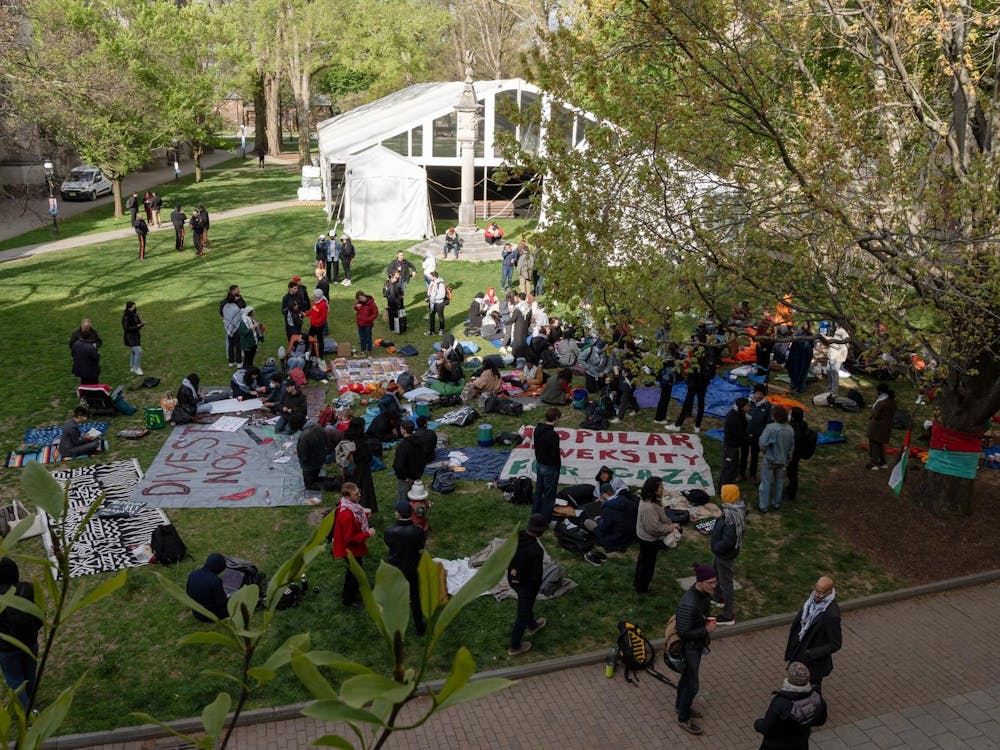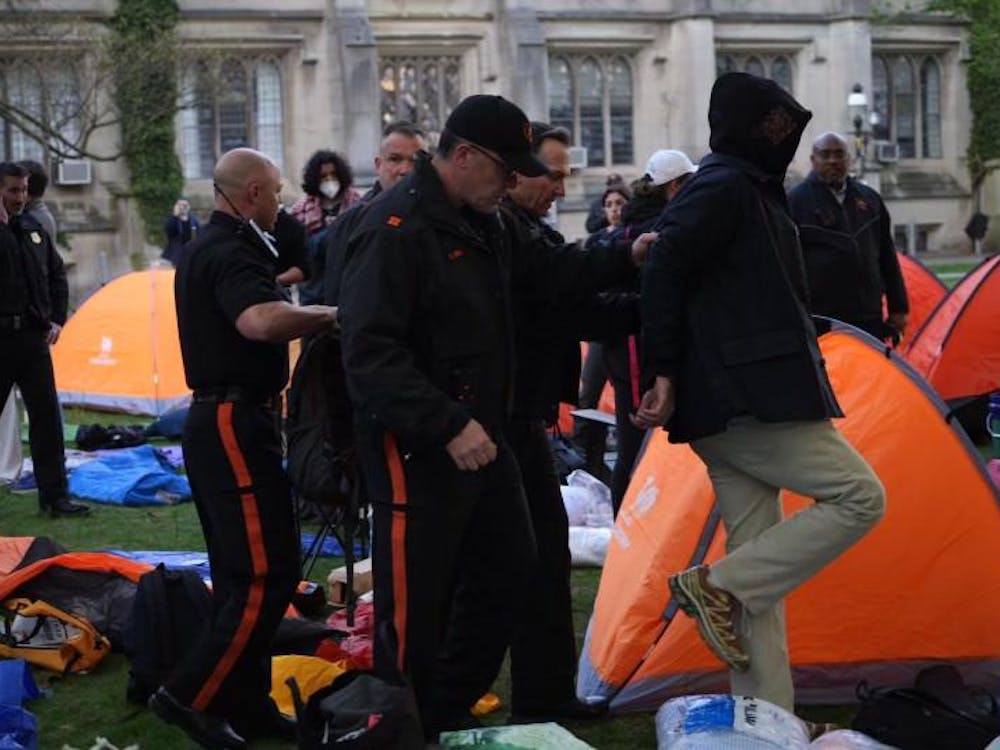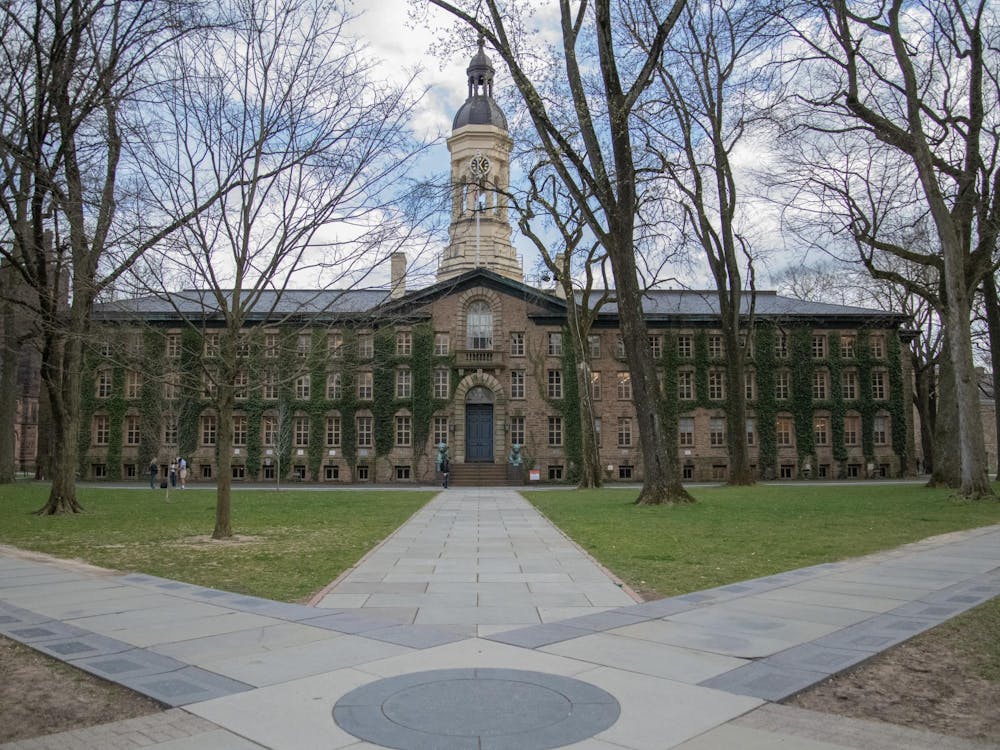The University administration has been discussing potential revisions of the University’s current policy on smoking on campus, and these discussions will expand to include undergraduate and graduate students, University spokesperson Martin Mbugua told The Daily Princetonian. The working group will also hear views from other parties on campus, he added.
“Rights, Rules, Responsibilities” delineates the University’s current smoking policy, saying that smoking is prohibited in all indoor workplaces and places of public accessby law and by University policy. The document adds a variety of examples of locationsthat qualify under this guideline, including University-owned vehicles and spectator areas at outdoor University events. It also notes that e-cigarettes are included under this policy.
The University has also recently placed signs on the doors of Frist Campus Center related to its smoking policy. The signs ask people to refrain from smoking within 25 feet of an entryway or air intake and note that smoking within the building is prohibited.
Mbugua noted the signs did not reflect a change in policy, saying the signs are simply a reminder for those who use the building.Mbugua also said the discussions also had more than one cause.
“We've heard from members of the University community who have expressed concerns about secondhand smoke,” he explained. “Also, there is a growing trend to change smoking policies across the country.”
Indeed, the University's review of the policies comes amid widespread changes in the way people approach smoking. While once uncommon, the number of “100% smoke-free” campuses in the United States hasincreasedfrom 586 three years ago to 1,477 today. Mbugua noted there were a variety of options for modifying the current policy and that it is impossible to predict what course of action the University may ultimately take. In addition, the town last year expanded its smoking ban to include outdoor locations as long as they are within municipal property.
Scrutiny toward smoking policies could also affect the eating clubs, which although privately run, are still included within the scope of smoke-free laws.
Eating clubs may be subject to same rules
Under the New Jersey Smoke-Free Air Act of 2006,almost all indoor workplaces are required to prohibit smoking. The only exceptions are tobacco shops, casinos and hotels and motels in some cases.
“Private college dining clubs are not excepted under the law,” attorney Karen Blumenfeld, executive director of Global Advisors on Smokefree Policy, which is based in Summit, N.J., said. “In 2007, state regulations also required that no outdoor smoke migrate into an indoor smoke-free workplace or public place.”
The town of Princeton prohibited smoking in “restaurants, bars, cabarets, taverns, work places, restrooms, lobbies, reception areas, hallways, elevators and all other public enclosed areas” in 2000. The ordinance, which was overturned later that year, also applied to eating clubs, according to a Daily Princetonian article at the time. The ordinance was effectively superseded by the New Jersey Smoke-Free Air Act.
According to members of Terrace Club interviewed, the club — which employs food service personnel, as well as an administrative and a business manager — effectively prohibits smoking in most rooms during the day. However, even during the day, some members smoke in upstairs rooms.

Terrace Club’s smoking policy was examined because a book, “Princeton University 2012: Off the Record,” published in 2011, claimed, “[Terrace] is the only club that permits cigarette smoking in the dining room.”
Blumenfeld said smoking is prohibited by law in workplaces at all times, even when employees are not present.
“The state law requires that a public place or workplace that is smoke-free be smoke-free at all times,” she said.
The law also does not make distinctions between areas within workplaces.
"[T]he separation of smoking and nonsmoking areas in indoor public places and workplaces does not eliminate the hazard to nonsmokers if these areas share a common ventilation system,” the New Jersey Smoke-Free Air Act reads in part.
The club adopted a smoking policy in 2010, which aims in part “toadequatelyaddress thelegitimate rights of nonsmokers,” according to a copy of the policy provided by Terrace Board Chairman Sandy Harrison ’74.
The policy adds that smoking is never allowed on the first floor of the club or in the basement storage areas; that smoking is not allowed before 6 p.m. on weekdays on the second floor, except in the library by consensus or on the outdoor fireproof deck; that members must comply with any officer or employee requests regarding smoking; that additional restrictions may be enforced in special cases; and that ashtrays must be used to dispose of tobacco waste.
“Anecdotally, there appear to be considerablyfewer smokers at Terrace Club than inthe years rightbeforethe policy was instituted,” Harrison said.
Under the Act, local boards of health are responsible for enforcement of the New Jersey Smoke-Free Air Act.
A representative of the Princeton Board of Health did not respond to an inquiry into the matter as of press time.
Intent of smoke-free laws 'not to hand out tickets'
The town of Princeton enacted a ban on outdoor smoking on municipal property last year, which includes municipal buildings, parks, pools and town-owned recreation areas, becoming the first town in Mercer County to do so. The town has the ability to issue fines for violations of this ban.
Heather Howard, a Princeton town councilwoman, former Commissioner of the New Jersey Department of Health and a lecturer in public affairs at the University, said the next step after passing the New Jersey Smoke-Free Air Act of 2006 banning indoor smoking was to examine outdoor smoking. She explained vulnerable populations, such as children and senior citizens, are commonly affected by smoking at outdoor areas like parks and swimming pools.
“Our intent was not to hand out tickets: it was to normalize smoke-free environments,” Howard said. “We've been leading that fight for 15 years. Smoking is the number-one preventable cause of death, and Princeton has been a community that has been leading the fight to promote healthy air and protect everyone by promoting smoke-free environments.”
Some students take issue
Anna Song, an assistant professor of psychological sciences at the University of California, Merced, whose research focuses on young adult risk behaviors, said that because marketing cigarettes to children is no longer legal, the tobacco industry invests heavily in advertising to young adults.
“When you’re on a college campus, you’re looking to see what’s the norm, what’s acceptable,” Song explained. “If smoking is acceptable on campus and if it’s widely spread, you’re going to see a higher likelihood that a kid who doesn’t smoke would smoke.”
Song added that the advertising surrounding smoking has evolved significantly since the days of the cartoonish Joe Camel figure.
“You’ve got young adults wearing jackets and carrying bags and cell phone cases with cigarette company logos, and that is very much … bringing brand recognition where they otherwise wouldn’t have it,” she said.
Andy Loo ’16, president of Princeton Libertarians, said owners of private property should have the right to make their own rules and that people who disagree with those rules can avoid that property. He added that he did not agree with state and municipal efforts to ban smoking unilaterally.
“That would mean the government would have the right to regulate overeating, sleeping too little or hitting yourself, and that is clearly absurd,” Loo said. “If someone does not like secondhand smoke they can choose to not to go to this building because of this policy.”
Song said tobacco control is more of a balancing act.
“We believe in individual freedom absolutely, but we also believe in the freedom to be healthy, and nonsmokers don’t have the freedom not to breathe in secondhand smoke,” she said. “Even third-hand smoke hits those who are most vulnerable, namely infants and children.”
Carey Camel ’17 noted that some smoke not out of addiction, but only in certain settings.
“It’s something you can do that’s a private thing. You can walk out with someone and take a smoke and have an actual conversation during the cigarette,” Camel explained. “If you would go to Terrace, you might find people who don’t normally smoke smoking, because they’re out having a good time.”
Carey added that while he supported the ban on indoor smoking, he was skeptical of the motives behind the town’s outdoor ban.
“I think it’s class-associated,” Camel said. “I think they tend to associate smoking with the ‘grubby lower classes,’ so I think it’s silly … If you’re outside, you’re just contributing to the general atmosphere.”
Reform would not be unique to Princeton
The University of California system is one of the largest institutions of higher education to approve a smoke-free policy in recent years. Tim Pine, an environmental protection specialist at the University of California, Berkeley and a co-chair of the tobacco-free initiative there, said the degree of compliance toward the new policy has been relatively high, estimating that 80 percent of the smokers to whom he has spoken personally have been understanding of the policy’s purpose.
“The most important thing is to get the campus police on board early,” Pine said. “Until you start hitting those hardcore smokers in the pocketbook and really inconveniencing them, they’re probably going to continue to violate.”
Pine also noted that the city of El Cerrito, Calif., where he serves on the planning commission, is considering similar ordinances.
“It’s a thing,” Pine said. “It’s sweeping the nation.”
The pharmacy chain CVS stopped selling cigarettes nationwide earlier this year.
“How are you supposed to promote health when you are dealing in products that when used as intended will kill you?” Song said. “I see no reason why a university couldn’t also [go smoke-free].”
Contrary to national trends, New Jersey Gov. Chris Christie vetoed a statewide ban on smoking on public property earlier this year. Christie is also an ex officio trustee of the University.
The University approved a smoking ban in the dormitories in 2005.
Then-Vice President for Campus Life Janet Dickerson noted at the time that while a poll showed a majority of students opposed such a ban in the early 1990s, the general trend went against smoking, as New York City restaurants and airlines had become smoke-free.








